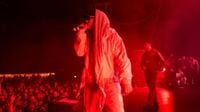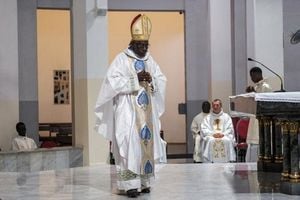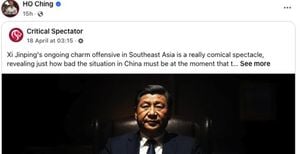The annual Coachella Valley Music and Arts Festival has become a hotbed for political expression, with the Irish hip-hop trio Kneecap making headlines for their provocative performance this past weekend. During their set on April 19, 2025, the band boldly displayed the message "F*ck Israel, Free Palestine" while leading the audience in chants supporting Palestinian liberation. This act of defiance has sparked widespread condemnation, particularly from Jewish human rights organizations.
Three days after Kneecap's performance, the Simon Wiesenthal Center issued a statement denouncing the band's actions as incendiary and anti-Israel hate. Jim Berk, the Center's CEO, emphasized the importance of music as a unifying force, stating, "At its best, music should bring people together and spread empathy, not hate." He pointed out the stark contrast between the festival's atmosphere and the tragic events of October 7, 2023, when Hamas terrorists attacked the Nova Music Festival in Israel, resulting in numerous deaths and abductions.
Kneecap's performance was particularly notable as it followed their previous set on April 11, 2025, during which festival organizers cut their verbal criticisms of Israel from the livestream. To ensure their messages were visible this time, the band projected text on screens surrounding the stage, making statements such as "Israel is committing genocide against the Palestinian people" and accusing the U.S. government of complicity through military support.
Despite the backlash, Kneecap's members, known for their politically charged lyrics, maintained their stance. Band member Mo Chara addressed the crowd, stating, "The Palestinians have nowhere to go. It’s their f—ing home. And they’re bombing them from the skies. If you’re not calling it a genocide what the f— are you calling it?" Such remarks have drawn both support and ire, highlighting the divisive nature of the Israel-Palestine conflict.
Sharon Osbourne, wife of rock legend Ozzy Osbourne, also weighed in on the controversy. In a lengthy social media post, she criticized Coachella organizers for allowing such inflammatory statements to be broadcast from a prominent stage. Osbourne argued that music should serve as a refuge and unite people rather than promote hatred or support terrorist organizations. She specifically called out Kneecap for their aggressive political statements and urged for the revocation of their work visa, emphasizing the need for accountability.
The festival has seen a range of political expressions beyond Kneecap. Other artists, including headliners Green Day, have also made pro-Palestinian statements during their performances. Billie Joe Armstrong, the lead singer, altered the lyrics of "Jesus of Suburbia" to reflect solidarity with Palestinian children, singing, "Running away from pain, like the kids from Palestine." This trend of political commentary at Coachella has raised questions about the role of music in social and political discourse.
As the Israel-Hamas conflict continues to escalate, with over 1,200 Israelis killed and many hostages taken since the outbreak of violence on October 7, 2023, the stakes are high for artists choosing to speak out. The Israeli military's response has resulted in thousands of deaths in Gaza, further complicating the narrative and fueling passionate responses from both sides.
Kneecap's approach to the conflict reflects their roots in Northern Ireland, where they have long been vocal about political issues, including Irish republicanism and censorship. They have previously stated that their music is inherently political due to their background, and their performances aim to challenge the status quo.
In a recent interview, Mo Chara expressed the band's desire to be seen as more than just a political act. "We’re a band, for f—’s sake. We make music. Obviously, we do things that are political. But I worry that just because we’re a band from Belfast that raps in Irish, any kind of political crisis, they’re like, ‘Oh, let’s f—ing ask Kneecap what they think,'" he said. This highlights the complexity of their identity as artists navigating the intersection of music and activism.
The reactions to Kneecap's performance at Coachella underscore the broader societal divisions surrounding the Israel-Palestine conflict. While some view the band's stance as a necessary challenge to injustice, others see it as an affront to the memory of those affected by violence on both sides. The ongoing discourse reflects the deep-seated tensions that continue to shape public opinion and artistic expression.
As the festival wrapped up, the conversations ignited by Kneecap and other artists lingered in the air, prompting attendees and viewers alike to reflect on the role of music in activism and the responsibilities of artists in a politically charged climate. Whether through protest or celebration, Coachella 2025 will be remembered not just for its musical performances but for the powerful messages that resonated on its stages.








